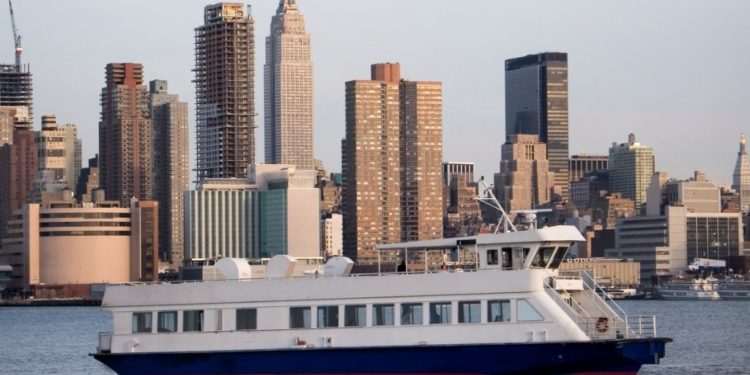Employees of a New York tour boat company filed a whistleblower complaint alleging illegal dumping of waste into the Hudson River.
The whistleblower complaint, which was previously under seal, details allegations of wrongdoing from two employees of New York Waterway, a company that operates “a fleet of over 30 ferry vessels carrying up to 30,000 passengers per day,” a passenger terminal, and a couple of fueling and maintenance docks. Both of the two whistleblowers, Rafi Khatchikian and Ivan Torres, “not only personally observed the improper discharge of pollutants alleged in this action, but was ordered and instructed by his superiors to engage in illegal pollution discharges,” according to the complaint. The complaint states that Khatchikian worked for New York Waterway as a fueler at the maintenance docks from 2013 to 2015, and Torres was a mechanic and fueler at the maintenance docks from 2011 to 2015.
The whistleblowers allege that New York Waterway would “discharge sewage and garbage from aboard ship into the Hudson River,” “improperly dispose of waste oil, fuel, coolant, batteries, and aluminum shavings into the Hudson River,” “improperly dispose of used oil filters by concealing them in black plastic bags and throwing them into common garbage dumpsters,” and “fail to properly document and advise government authorities of the time, location, pollutant, and quantity of these discharges.” The complaint states that the actions allegedly undertaken by New York Waterway violated several environmental laws, including the Federal Rivers and Harbors Act of 1899 (also called the Federal Refuse Act), the Federal Water Pollution Prevention and Control Act, or the Clean Water Act, the Act to Prevent Pollution from Ships (APPS), and the New Jersey Water Pollution Control Act. Whistleblower protections are included in the Clean Water Act and APPS.
The whistleblowers are seeking “compensatory, punitive and other damages, restitution, reimbursement and civil penalties under applicable laws, and other equitable and legal relief against Defendants,” according to the complaint.
Beyond their complaint, the whistleblowers have also spoken out about their experiences working for New York Waterway and the actions they allegedly witnessed. “Anything that goes into a toilet would come right out,” Khatchikian told The New York Times in a December 4 article. “It was horrible,” Torres said in the same article. “You’d go home and go to sleep and your nostrils still smelled of it.”
Thus far, New York Waterway “denies the allegations,” with the company’s chairman Armand Pohan stating, “We think it’s totally without merit.” Federal prosecutors have also stated that “they had declined to intervene in the case after a lengthy investigation led by the Environmental Protection Agency.” The EPA investigation began in 2016 “and appeared linked not just to the claims raised by the two men. Another employee, a captain, had expressed similar concerns, according to the records, which were heavily redacted,” according to the article.
Patrick Smith, a spokesman for New York Waterway, said in a statement that the complaint “was filed by two disgruntled ex-employees” and pointed to the U.S. government’s decision to not pursue the case as demonstrative of the “baseless nature of these claims.” A spokesman for the U.S. attorney in New Jersey “had no immediate comment” and the lawyer hired by New York Waterway “declined to comment,” according to the New York Times article.


